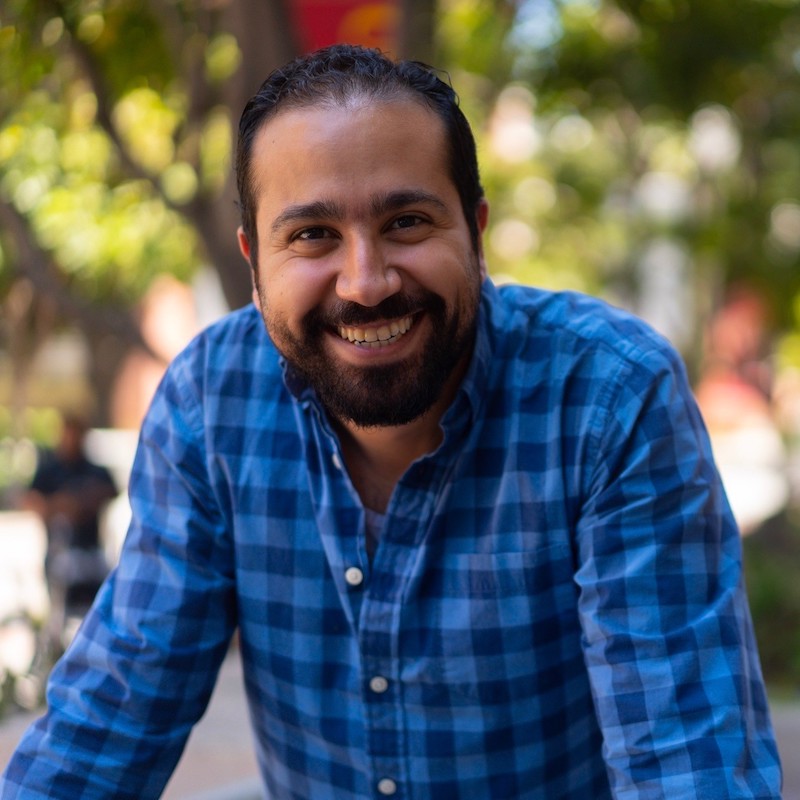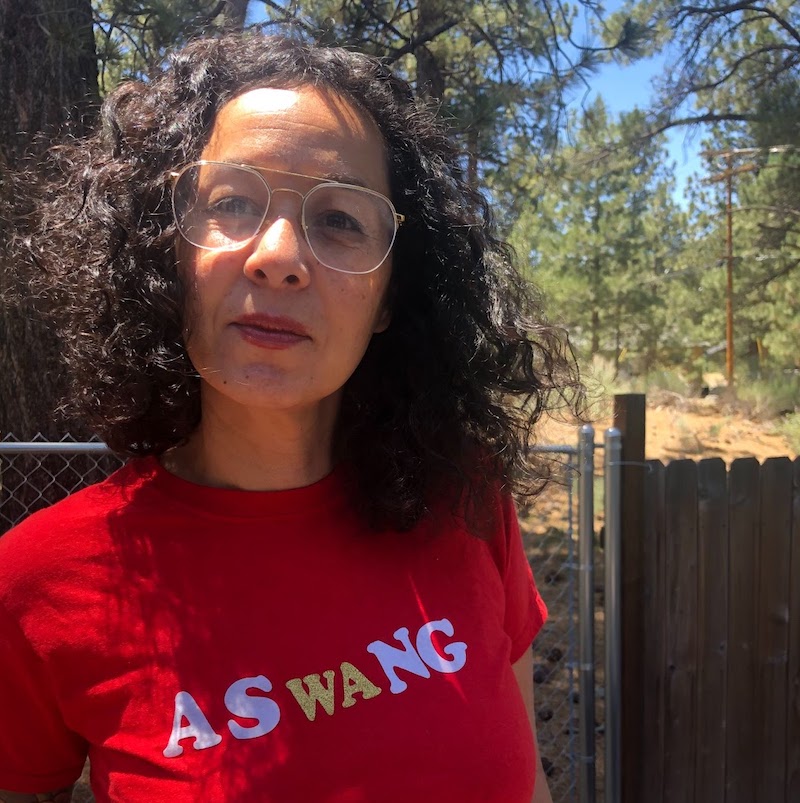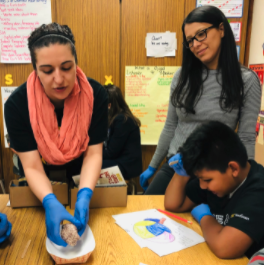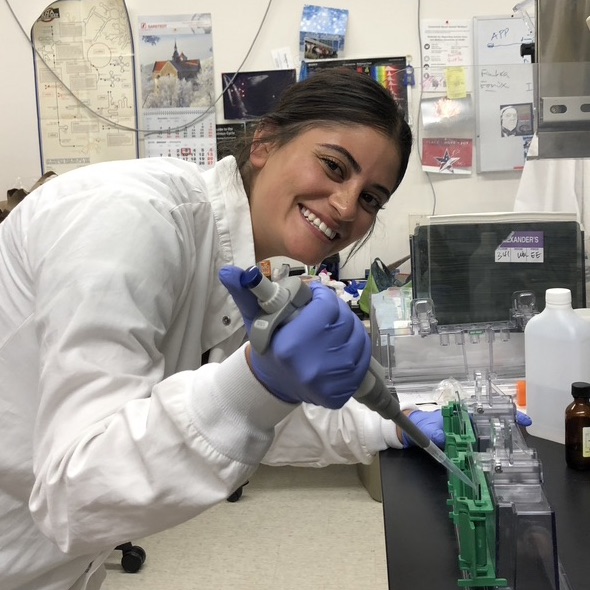About Us
We are an organization by, of, and for Graduate Student Workers (GSWs) who want to unionize in order to improve our teaching, research, and employment experience at USC. Our work as Teaching Assistants, Research Assistants, and Assistant Lecturers not only benefits the university and the California economy, but also has positive impacts worldwide. We work in many different fields and have varied experiences, but our dedication to teaching and research unites us all.

Pragya Arya, Psychology
I’m a graduate student worker and PhD student in psychology studying people’s perceptions of social issues, including issues like harassment and discrimination. Currently, our academic system actively obstructs the success of individuals underrepresented in higher education and ensures that the status quo remains. As an international, first-gen, LGBTQIA+ graduate student, I have faced constant hurdles through my years in graduate school that have caused significant distress to my life– including (but not limited to) inadequate health insurance, inadequate and unfair compensation, inconsistent pay schedules, and harassment due to my gender identity. I support forming a union because I believe it is the only way we can ensure a safe, supportive, equitable, just, and respectful working environment for all graduate students, and ensure that our basic needs as human beings are met.

Ahmed El-Baradei, Mork Family Department of Chemical Engineering and Materials Science
I am a graduate research assistant at USC Mork Family Department of Chemical Engineering & Materials Science. I study proteins and receptors and how their microenvironment in the plasma membrane can change their functionality. Academia came a long way but still needs work. A graduate student worker union means a space and a voice for us students to support each other and help academia to do better. With the rapid increase in prices and rent around USC, we need to get better pay. We need an out-of-system voice to advocate and push for better mental health, higher pay, and better accountability.

Claire Crawford, Political Science and International Relations
I am a teaching assistant in the Political Science and International Relations department, where I study how sound and song can expand our notion of the political and power through my study of Black liberation movements. In the wake of George Floyd’s murder, BIPOC (Black, Indigenous, People of Color) graduate students began to organize in various departments to confront the university’s institutionalized whiteness and our departments. As time has passed and demands have fallen on deaf ears, BIPOC students’ realities remain the same. I support unionization because a student union creates space and institutional support to push against the structures of violence, privilege, and oppression that we BIPOC students are confronted with every time we interact with USC.

Javier Rivera, Annenberg School for Communication and Journalism
I’m a second year PhD student in Communication and a teaching assistant at the Annenberg School for Communication and Journalism. I support grad student worker unionization because we provide essential labor to the university and deserve dignified working conditions. Additionally, I believe that a strong student union offers support to my international student colleagues and to student workers who face harassment and discrimination.

Katie Orban, Molecular Biology
I’m a research assistant in Molecular Biology. During my time at USC, many of my fellow graduate students and I have been harassed by staff and faculty in positions of authority. Almost none of us have reported the harassment we face, in part because of the perception of the university’s harassment investigation procedure as biased toward our harassers. I believe we need a graduate student union because a union has its own investigation procedure that I would trust. Graduate students deserve to be treated with respect in a harassment-free work environment.

Jason Vu, American Studies and Ethnicity
I’m a graduate student worker in the American Studies and Ethnicity department where I study Southeast Asian refugee deportation and US imperialism in the Pacific. Graduate student workers are an integral part of making USC the institution that it is. As a TA, I want the university to respect the time and effort I put in for my students. By forming a student worker union, we will be able to collectively advocate for our respect and safety while also pushing for the compensation that we so rightfully deserve.

Hamsini Sridharan, Annenberg School for Communication and Journalism
I’m a Graduate Assistant in the Communication PhD program at Annenberg, studying the cultural imaginaries in critiques of digital technologies. I strongly believe that we need a union that can represent the interests of student workers to the university in order to transform our working conditions, including negotiating for a meaningful living wage and benefits, improving policies around harassment and discrimination, and creating a more just and inclusive university community. Our labor is incredibly valuable to USC, but the administration often devalues us; it’s only through joining our voices together that we can push back.

Siddartha Devic, Computer Science
I am a first year PhD student in the theoretical computer science group at USC, where I study theoretical machine learning and algorithmic fairness. I support unionization because I believe in the power of collective action for workplace democracy. I am particularly interested in bettering the international student experience. Although I am a domestic student myself, many of my peers and colleagues in Computer Science are international and face many issues that the university can substantially help alleviate, such as on-time stipend payment and transparent communication regarding policy decisions. International PhD students also face financial issues while moving to the US which I don’t believe are properly addressed by the university—for example, obtaining credit and security deposits which are required to be able to rent an apartment around campus. I believe that unionizing can effectively address these issues.

Ruozi Song, Economics
I am a graduate student worker studying economics at USC. I support the graduate student union as I believe all graduate student workers should be treated fairly. By forming a union, graduate student workers can work collectively and negotiate to make the working environment a better place.

Bryan Byrdlong, English
I’m a writer, poet and Creative Writing and Literature PhD student at USC. I support forming a union of Grad Student Workers at USC because it is a sustainable way of helping graduate students obtain better wages, healthcare, and benefits. It would empower USC grad workers as self-advocates and leaders. And, importantly, it would help to make sure that the essential work, teaching, and research that we do at the university is able to continue for future generations even through changing and uncertain times.

Maddie Thayer, Classics Department
I’m a graduate student in the Classics department, and my research focuses upon the Latin literature of the early Roman empire. I’m a strong advocate for an independent graduate student union because it will allow us to negotiate directly with the university on behalf of our shared interests. United across our programs and schools, together we can fight for better working conditions and a more inclusive environment for ourselves and for future graduate students at USC.

James Fortwengler, Chemistry
I am a Graduate Student Researcher in the chemistry department studying organic semiconductors for organic light emitting diodes (OLEDs) and organic photovoltaics (OPVs). Unionization is a critical first step to combat unsafe working conditions, discrimination, harassment, and unfair compensation. Forming a union together will ensure that our best interests are upheld, allowing us to productively work and conduct research rather than being slowed by our lack of fundamental workers’ rights.

Dmitrii Kuznetsov, Slavic Languages and Literatures
I am an international student worker in the Slavic Languages and Literatures department, and I study contemporary Russian literature and memory studies. During the Covid-19 pandemic my colleagues and I were told by the university that we were not allowed to teach online from our home countries, even though many other universities accommodated their international student workers who could teach from abroad. This forced many of my colleagues to take a year off their fellowship, potentially affecting their progress towards the completion of their dissertation. While USC gave faculty an extra year towards their tenure, similar privileges were not extended to graduate student workers. I support unionization because having a student worker union will allow us to advocate collectively for international student worker rights and end policies that discriminate against international student workers at USC..

Jane Kassavin, Latin American and Iberian Cultures
I’m a graduate student studying Latin American poetics and an Assistant Lecturer in the Spanish department. As a student worker with numerous chronic health conditions, I have both had to pay thousands of dollars in health insurance premiums that have worsened throughout the years (including during the Covid-19 crisis), and have also struggled to secure accommodations that make both teaching and research more sustainable for me. A union would give us a voice to bargain for both health insurance and working conditions that better meet our needs, and give us the freedom to pursue our research without worrying about our physical and mental health (and enormous bills related to them). I strongly believe in the necessity of this process to dismantle harmful ableist systems within the university, and to make graduate school more accessible to those with disabilities and chronic illnesses.

Michaela Telfer, Comparative Literature
I’m a graduate student in Comparative Literature and an Assistant Lecturer in the Thematic Option program. Due to changes to the academic calendar, the schedule for the pedagogical training that every graduate writing AL is required to complete was changed in August 2020 so that every AL would be working for the entire month instead of half of that month. However, the university would only pay us for half a month of work, insisting that required employee training is not meant to be compensated labour, but a learning experience. Forming a graduate workers union will allow us to ensure that every graduate worker is paid fairly for all of the work that they do as employees of the university.

Bixing Qiao, Mathematics
I’m a PhD student and teaching assistant in Mathematics. My research interest is in stochastic processes. I believe in unionizing because I think having a union can protect our rights to have a safe working environment and fair compensation for our labor. Even if I’m not in need right now, I can empower my fellow grad student workers who are in need. And when I face discrimination or unfair treatment, I will know that my coworkers have my back.

Annastasia Haynie, Physics and Astronomy
My name is Annastasia Haynie and I’m a graduate student worker in the Physics and Astronomy department. Our department relies heavily on graduate students who are classified as half teaching assistants, half research assistants, but there is little difference between this position and full teaching assistants. Half TA’s are expected to complete far more than 50% of a full TA’s workload during a normal week and grade the same number of exams as full TAs. When students went to the department with these issues, they were told to “just grade faster”. I support unionization because I believe that graduate students should be paid fairly for the work that we do and should not be expected to complete large amounts of work that is outside of our position descriptions. By forming a union we can negotiate for clear distinctions between graduate student worker roles and how we should be compensated for our work.

Stepp Mayes, Civil and Environmental Engineering
I am a Teaching and Research Assistant in the Civil and Environmental Engineering Department at USC studying California’s electricity sector. As a first year graduate student, I remember asking an older student about health insurance and being told that we don’t really have dental or eye insurance. Our physical and mental health as graduate students depends on having a safe and harassment free workplace, a healthy work-life balance, and adequate healthcare. Forming a union is the best way to make this a reality.

Antonia Crane, English
I’m a CNF writer and graduate student worker at USC. Forming a union with my coworkers is an important step to ensure equity and fairness in the area of wages, healthcare and our collective future as educators and researchers. By building trust and cohesion in our workspace, we can negotiate for valuable post-pandemic needs like paid bereavement leave, affordable, reliable healthcare that covers and includes our LGTBQIA+ partners, and pay raises that reflect our current economic landscape.

Daniel Scott, Rossier School of Education
I am a research assistant and Ph.D. student at the USC Rossier School of Education. I am studying labor in higher education and the intersection of higher education and the criminal justice system. Graduate student workers play an essential role in sustaining colleges and universities by teaching, conducting research, drawing fellowship funding, winning grants, and doing administrative work (to name only a few key contributions). Graduate student workers often serve as the driving force behind transformations that improve the reputations of colleges and universities and that help guide colleges and universities toward contributing to the public good. Without the essential labor of graduate student workers, academia could not function; without the ethical commitments graduate student workers bring with them, academia could not retain legitimacy as an institution that is worth sustaining. By forming a union, we as graduate student workers gain control over our working conditions and compensation and build power to participate in governance at a level that matches the magnitude of our contribution.

Melissa Chadburn, English
I am a Graduate Student Worker in the English Department at USC. I support unionization because I believe in our collective rights and negotiating power to bargain better medical benefits. Time and time again I have received a bill for medical appointments, but no one could tell me what each service would cost prior to the appointment. I felt powerless and unable to budget for my healthcare needs.

Yoni Hirshberg, Cinema and Media Studies
I’m a teaching assistant in the Cinema and Media Studies program. We need a union because we deserve a living wage. As of now, our wages are too low to cover the cost of living in LA, meaning we often have to take second and third jobs to pay for rent. Our labor is crucial to the teaching and research mission of USC. The university wouldn’t function without us. We bring in a huge amount of money for them, yet we are barely compensated. The USC administration says it values diversity, but by refusing to pay us a living wage, they make the university inaccessible for people without means. A union would allow us to negotiate for better pay and make the university a more equitable place.

Ben Bush, English
I believe labor organizing is one of the most important tools we have in fighting income inequality. There is room for greater equity here at USC and everywhere.

Samuel Teets, English
My name is Samuel Teets and I’m a fourth-year Ph.D. candidate in English at USC. I research gender and sexuality studies and American multi-ethnic literatures – areas of research that only became recognized by universities after vital student activism and organization. To be able to research as students, we need our basic needs met as people – childcare, health and dental insurance, housing and economic security. A strong union helps to meet these needs, and continues to inspire the socially-minded, innovative, and collectivist practices for students to keep working toward the worlds we want to live in.

Rita Barakat, Neuroscience
I’m a graduate student researcher and teaching assistant in the Neuroscience Graduate Program (NGP) at the University of Southern California (USC). I believe that it’s extremely important for graduate students to be able to collectively organize and negotiate with higher academic institutions in order to ensure that discrimination and harassment of any kind is effectively mitigated. In addition, I feel very strongly about the importance of clear communication at all levels of power within academic institutions, and I am confident that unionization would support efforts towards fostering more transparent and open communication channels.

Jun Lyu, Linguistics
My name is Jun Lyu, a graduate student worker and PhD student and in the Department of Linguistics where I do research in the field of psycholinguistics. As an international student, I feel unionization is critical to the protection of our rights. International TAs often face a lot of pressure while teaching and researching in a new culture and academic environment. I believe that a union will ensure that international TAs have the same fair treatment and respect. Another reason why I support unionization is that a union enables us to bargain more effectively with the university.

Ana Silverstein, Molecular Biology
I’m a Graduate Student Researcher in Molecular Biology. Managing the cost of living in this area with our salary has been one of the hardest obstacles for me and my peers to overcome, especially for those of us who are first generation students pursuing higher education. Our budgets are tight, and they’re made tighter by low salaries, and excessive student fees that are nearly required for our success; like parking permits, which is the 2nd largest source of revenue for the university and costs close to 5% of our salary. We deserve to live comfortably while working for this university. Forming a union is the best way for us as student workers to have a voice and create the power needed to advocate and negotiate for necessary change.

Layla Vasquez, Neuroscience
I am a graduate student researcher in the Neuroscience Program at USC. I believe unionizing is the necessary foundation to guarantee equity among all departments and the key to improving inclusivity and diversity within the academic community!

Adam Woodnutt, Linguistics
I’m Adam Woodnutt, and I’m a graduate student worker and PhD student in the Linguistics department. My research focuses on syntax, semantics, and their interface. I’ve experienced firsthand how the university can fail its graduate student workers, especially the most marginalized among us. I support unionization because I want to stand with my fellow graduate students workers to uplift, empower, and help each other.

Daniel Goodelman, Aerospace and Mechanical Engineering
I am a PhD student and graduate student researcher studying mechanical engineering with a focus in material science. Unionization of student researchers, especially at a private institution, is critical to ensure fair livable wages, safe working conditions, and the right to have our voices heard in administrative decision making. The ability to collectively bargain allows us to protect our best interests and grants us the opportunity to focus on our research, rather than difficulties caused by a lack of workers’ rights.

Megan Cassingham, Chemistry
I am a Graduate Student Researcher in the chemistry department studying hybrid organic-inorganic materials. Forming a union is the best way for all Graduate Researchers across USC to stand in solidarity against persistent issues of discrimination, harassment, and fair compensation. The most effective way to have our needs met and ensure equitable working conditions in perpetuity is to lead the charge together to uplift and strengthen each other within our own union democracy.

Andrew Stewart, Philosophy
I am a Ph.D. student and TA in Philosophy at USC. I support unionization because of the future. With the rise of online learning, contingent labor, and political attacks on higher education, it is unclear how academia will change in the coming months and years. And we’ve seen COVID create logistical nightmares and threaten job security, especially for international students. Graduate student workers perform essential labor for the university and should not have to pray, when the unexpected happens, that enough administrators in high places will decide to help. A union would amplify our voices and help us fight for a more just university.

Missy Rogers, English
I support unionization because graduate workers provide USC with critical labor as instructors and researchers. Collective bargaining gives us power, protection, and mutual advocacy.

J.E. Paguyo, Mathematics
I am a 4th year math PhD student and teaching assistant at the University of Southern California. I firmly believe in the necessity and importance of inclusive, diverse, and equitable research and teaching environments. Forming and being part of a graduate student union will provide us with the power to collectively negotiate for better protection, wages, benefits, and work conditions, and allow us the flexibility to represent our best interests.

Ana Howe Bukowski, Annenberg School for Communication and Journalism
I’m a doctoral candidate, TA, and RA in Communication at USC Annenberg. As graduate student workers, we are all vulnerable at USC, a private institution that has repeatedly put profits over protections. Forming a graduate student union will help us remain united in securing proper working conditions, cost of living adjustments to our salaries, support for students with dependents, and help address systemic issues and discriminatory practices at the administrative level. With a strong union, we can push for fair representation and have our concerns heard.

Maria Labourt, Sociology
I am an international student worker in the Sociology Department. This last year, as we recover from exceptional difficulties brought up by the pandemic, the US has experienced a 6.2% inflation rate (October 2021). I come from a country where inflation has been a big issue for the last decade, and I know the only way to mitigate its effects on the most vulnerable is through organizing and collective bargaining. We, students workers, rely on a modest stipend while we work long hours seven days a week. Forming a graduate student worker union is essential to advocate for a rise in pay that matches the high cost of living in Los Angeles.

Vaclav Masek, Sociology
My name is Vaclav Masek, and I am a 2nd-year Ph.D. student and international student worker in Sociology from Guatemala. I would like to form a graduate student worker union to directly pressure the university to support international students. By coming together to unionize, we can have a platform to address common concerns such as clarity in departmental hiring processes and job opportunities for international student workers. Participating in a collective endeavor like a union will help us navigate the university and help us build the power to create legally binding improvements to the international student worker experience.

Sam Armon, Mathematics
I’m a graduate student worker in the mathematics PhD program at USC. I support forming a graduate student union because workplace democracy and collective bargaining provide us with the power to directly shape our working conditions, and the comfort of knowing that our best interests are heard and acted on. A union would supply us with a platform to fight back against inequity and discrimination, in order to cultivate an inclusive and supportive working environment.

Michelle Risacher, Cinema and Media Studies
My name is Michelle Risacher and I am a MA student in the Cinema and Media Studies department. I work as both a teacher’s assistant and reader, yet my TA position pays nearly triple what my readership does despite the fact that both positions require about the same amount of labor in terms of grading. I support unionization as it will allow us to clearly delineate the job responsibilities of a TA from a reader to ensure that we are paid fairly for our work. Forming a graduate student union is the first step to rectifying inequities concerning wage compensation at USC.

Isabel Wade, Art History
My name is Isabel Wade and I am a graduate worker in the Art History department. Throughout my six years at USC, I have had to navigate through obstructive, hostile, and confusing encounters with administration regarding myriad financial issues regarding stipend payment schedules, unclear university fees, and student health insurance policies. Furthermore, my stipend has not increased to reflect inflation over the past six years, resulting in an overall decrease in pay. On numerous occasions, USC has, with little warning, changed payment schedules and the dates on which workers are paid, which has risked graduate students not having money for basic needs including money for food, rent, and transportation, a heightened concern during a global pandemic. My colleagues and I have on numerous occasions advocated for ourselves, without support from the University, to demand transparency about when we will be paid and why we owe unexplained bills not covered by our fellowships. No worker should be left to beg for answers about when they will receive what they are owed. I am organizing to form a union with graduate student workers because USC must reform its administrative policies and honor the basic rights of all its workers, ensuring we earn a living wage. A union will provide the necessary support and advocacy that we need to ensure a fair and equitable work environment.

Stacie Chadwick, Linguistics
I am a graduate student worker and PhD student at USC where I study phonetics and phonology in the Linguistics department. In the school where I did my Master’s degree, I saw how critical a student union was in making sure my fellow students received fair pay and treatment when the global pandemic hit. In an ever changing world, it is important to support each other. When disaster strikes it’s nice to know that there are people out there who care for your well being and have your back. I have seen the success of a union as a support system, and I know it will be beneficial here at USC not only in times of crisis, but also in the general improvement in our day to day lives.

Meg Tiller, Religion
My name is Meg Tiller and I am a graduate student worker in the Religion Department at the University of Southern California. Although this is my third year as a PhD student, I have yet to receive a raise from the University. Furthermore, many graduate students have spouses and children that we cannot add to our health insurance. This has put an even further financial strain on us during a global pandemic. Forming a union is vital to me to ensure that we get paid a living wage for our work. We are employees of the University and should be treated as such. A graduate student union would allow for more opportunities to have a say in our pay and working conditions.

McKenna Peplinski, Civil and Environmental Engineering
At USC, I am funded by working as an RA/TA. PhD stipends have not increased with the cost of living which requires student workers to stretch their income to cover the cost of necessities like rent and food. This means that PhD students are unprepared for any kind of financial stressor, and serves as a barrier to participation for potential PhD students that lack prior wealth, or that have additional financial burdens like supporting dependents. PhD students should be compensated fairly and competitively in a way that accounts for the cost of living. Forming a grad student union will give us the platform to demand stipend increases that more accurately reflect the cost of living in LA.

Ellen Herschel, Psychology
I am a graduate student studying music, creativity, and the brain in the Psychology department at USC. During the COVID-19 Pandemic, hundreds of thousands of individuals lost their jobs, including my spouse who was unemployed for 13 months. Unfortunately, I did not have the ability to add him to my health insurance at USC, placing us in a precarious position of paying more than $600 in COBRA health insurance per month, or choosing to forgo health insurance for my spouse completely. Other universities offer the possibility of adding dependents on to healthcare plans for a small monthly fee, and it is time for USC to meet that standard offered by other universities. While single voices can raise awareness of personal issues, it is in our community where we find strength to support one another through our individual challenges. This power in unity allows us to collectively work for an environment that mitigates harassment, inequity, and discrimination while advocating for diversity and open communication.

Ben Flanagan, Marine Environmental Biology
As graduate student workers, we perform fundamental duties essential to the University function as an educational and research institution. These duties include but are not limited to instructing undergraduates, mentoring students, conducting research, and serving member departments on various committees and working groups. Yet, the University fails to see the graduate student workers’ inherent value when they treat us as students when convenient or employees when it befits their interests. Further, the pay for graduate student workers changes at the behest of the University without cost-of-living annual adjustments and no concern for delayed or altered payment. For these reasons, I’m in favor of Unionization to ensure graduate student worker prosperity into the future which will allow graduate student workers to further contribute to the University as valued members with ameliorated anxieties associated with financial stress.

Piril Nergis, Electrical Engineering
I support unionization because currently there are no means for graduate student workers to bargain our contracts and legitimately protect ourselves against faculty and university abuses. Not only do we generally work more than the 15-20 hours a week allotted in our contract, but we receive little compensation for our work especially given that we live in Los Angeles where about half our monthly paycheck goes to rent. In addition, graduate students should be on equal footing with faculty and to do so we need a union to keep the university accountable for its faculty’s emotional, financial, and physical abuses. No student, regardless of identity or history, should fear retaliation for speaking up for themselves and their fellow graduate student workers. We’ve tried to bring a professor’s xenophobia and racism to the attention of the EE department, but there has been no serious concern from the department and on top of that, international students had vocalized concern for even signing their names on the petition. We need a union.

Zak Breckenridge, English
I am a PhD student in English and an Assistant Lecturer in the Writing Program. I study the aesthetic histories of nature and the discursive histories of environmental advocacy in the United States. During my time at USC, pay schedules, fellowship opportunities, and COVID safety procedures have been changed, unilaterally and without warning, multiple times with little justification and no input from workers. Such administrative caprice makes professional and financial planning more difficult and underlines our disposability in the eyes of the university. I want to form a union to give graduate student workers a voice and increase transparency, accountability, and democracy at the university.

Jessica Campbell, Linguistics
I’m a graduate student worker and PhD student in linguistics studying the coordination of movements of the vocal tract in people with speech disorders as well as typical speakers. I fully support a union for graduate student workers because I want to unite with my peers to promote equity in academia. With our collective power we can fight harassment and discrimination and make academia a better place for everyone.

Wes Wise, Mathematics
I am a first year PhD student in mathematics. Historically, unions have increased wages, improved workplace quality, and limited workloads. Graduate school is notoriously difficult, and we need all the protection we can get: financial for living in Los Angeles, medical for working through a pandemic, mental so we can continue to produce research at an acceptable rate. I support forming a union to ensure all graduate students are able to continue their academic pursuits safely.

Jenna Dilworth, Marine and Environmental Biology
I am a graduate student worker in the Marine and Environmental Biology section of the Biological Sciences department. Graduate students in our department take on essential roles as teaching and research assistants, making immense contributions to research and the instruction of undergraduates. Additionally, the graduate student workers in the Marine and Environmental Biology section are often the driving force behind efforts to address issues relating to diversity, equity, and inclusion, investing significant time and effort into unpaid work to begin breaking down the barriers that exclude groups that are presently underrepresented in STEM. I support a graduate student union because I want to ensure that going forward, graduate student workers have the power to advocate for a more inclusive environment at USC and be more appropriately compensated for their valuable contributions to the university.

Ian Anderson, Psychology
I am a PhD student in the social psychology area, studying habits and social media use. I believe a more equitable workplace is necessary for all graduate student workers, including those pursuing doctoral degrees. I believe graduate student labor must be recognized as labor, and that all student workers should be paid, at minimum, a living wage that meets their needs in Los Angeles. I also believe that the university can and must look forward, away from hierarchy and towards a more democratically-run workplace. I am excited about forming a union at USC because it gives all graduate student workers the power to collectively determine for ourselves what this means and what our workplace should look like.

Tori Cassady, Earth Sciences
My name is Tori Cassady and I am a graduate student worker in Earth Sciences at USC. My department relies on graduate students for an incredible amount of work including teaching, outreach work, and research. Yet, our pay continues to fall behind the cost of living in Los Angeles. Even if we get a pay increase, it does not scale with cost of living, especially during the COVID crisis. USC hides from this fact using semantics and distractions from the reality that a small pay increase is actually a pay cut when large cost of living increases are taken into account. Our labor generates an astronomical value for USC while we, the workers, are paid well below minimum wage, and our wages effectively fall every year. Many of us have faced health issues and bills because of stress imposed by academia as well. Despite this, graduate students have little voice over improving pedagogy, new hiring decisions, and protecting ourselves against unfair and/or abusive treatment from faculty or USC. I am strongly supportive of forming a graduate student union because it will give us a legal framework for us to both defend ourselves against unfair treatment from USC as well as advocate for equitable and healthy working conditions including better pay.

Lyr Colin, Comparative Literature
I am a graduate student in Comparative Literature and an international student. As an international student especially, I have found myself struggling, including but not limited to lasting issues with payments, which the school has been less-than-accommodating about. Around me, I hear other stories of international students also having issues, especially in the midst of COVID: questions regarding living in Los Angeles while the campus was closed or teaching from abroad, concerns about being asked to teach (now without a mask mandate or mandated testing) while having comorbidities or living with vulnerable people… Having the support of a graduate student worker union would allow us to share our voices within a collective, and amplify each other in a way that the school could not ignore or push to a “personal, case-by-case” issue. Sharing concerns among us is what will allow us down the line to reach better, more equitable working conditions.

Stephanie Navarro, Epidemiology
I’m a PhD student in Epidemiology and a TA in the department of Population and Public Health Sciences. My research focuses on understanding how patients’ experiences with their health care are related to their health outcomes and how these relationships are different for racially and ethnically diverse patients. While some of my greatest joy, learning, and growth during my time in this program has come from being a TA, this has often come at the cost of delayed progress in my own research and timeline as a student. Forming a union would mean that we, as graduate student workers, would have the power to push for standardized graduate student workloads which would allow for graduate student work, such as TAships, to be completed with ample time remaining to focus on individual degree progress as well.

Eneos Çarka, Cinema and Media Studies
I’m a PhD student and a Teaching Assistant in the Cinema and Media Studies Department at the School of Cinematic Arts. As an international student arriving at USC during the Covid-19 pandemic, I experienced delays in receiving my stipend for the first two months. Despite an endless chain of back and forth emails with the University, I received no support and had to rely on my own savings to pay rent and cover my living expenses. I believe that by forming a graduate student union, we could come together to actually address issues like late payment, as well as our concerns as workers more broadly vis-a-vis negotiating for a meaningful living wage and benefits, improving policies regarding discrimination and harassment, and shaping the university community in inclusive ways.

Maggie Davis, Sociology
I am a PhD student and Teaching Assistant in the Sociology department at USC, and I strongly support forming a union. I believe that unionization is the best and surest path to voice our common concerns as student workers and, most importantly, to have those concerns meaningfully addressed by the university. While we all share a passion for our work, we also understand that our current working conditions—unlivable wages, unsafe research and classroom environments, discriminatory administrative practices, etc.—create an increasingly unsupportive and unsustainable working environment. A union would provide us with representation on wage-related issues like recent cuts to advanced fellowship support and funding during the summer months, and help us to advocate for clear Covid-19 policies that prioritize keeping workers safe. The only guarantee for full representation as we pursue recognition of our essential place in the university and the larger academic community is a certified and mobilized union.
